Key takeaways
- Successful Republican campaigns prioritize grassroots mobilization and community engagement, strengthening emotional connections with voters.
- Meticulous planning, including venue selection and volunteer coordination, is crucial for creating impactful and vibrant events.
- Effective communication with supporters fosters trust and commitment, emphasizing the importance of personalized interactions and consistent messaging.
- Flexibility and active listening during events enhance adaptability and leadership, creating memorable experiences that unite participants.
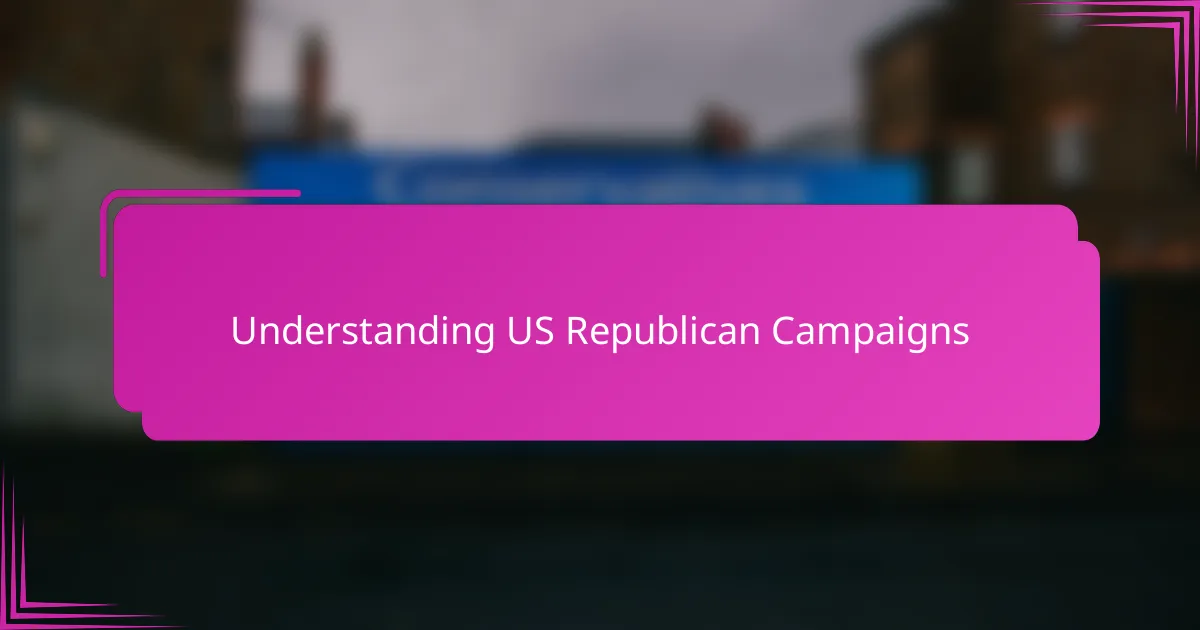
Understanding US Republican Campaigns
Understanding US Republican campaigns means recognizing their deep connection to conservative values and grassroots mobilization. From my experience organizing events, I noticed how every detail—from messaging to volunteer coordination—reflects a commitment to fiscal responsibility and individual freedom. Have you ever wondered why these campaigns focus so heavily on community engagement? It’s because personal connections drive their energy and shape voter enthusiasm.
I recall one campaign where the volunteers’ passion was palpable—they weren’t just working; they truly believed in the candidate’s vision. This emotional investment transforms simple gatherings into powerful moments that energize supporters and build momentum. Campaigns aren’t just political machinery; they’re communities fueled by shared ideals.
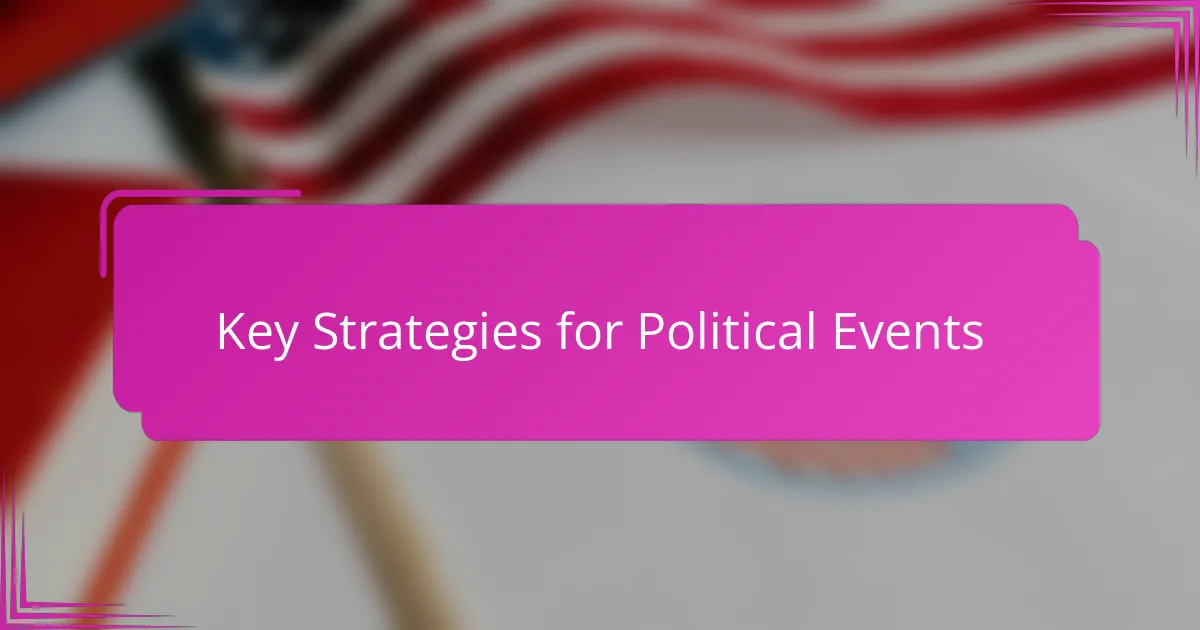
Key Strategies for Political Events
One key strategy I always rely on is tailoring the event’s tone to reflect core Republican values—whether it’s through speaker selection or thematic messaging. Have you noticed how an event feels more authentic when every element resonates with attendees’ beliefs? In one instance, emphasizing economic freedom in every speech helped deepen attendees’ connection and kept conversations lively long after the event ended.
Another crucial aspect I’ve learned is the power of meticulous volunteer coordination. It’s not just about assigning tasks; it’s about fostering a sense of ownership and pride among volunteers. I remember a local rally where each volunteer felt integral to the event’s success—this collective enthusiasm was contagious, turning onlookers into active participants.
Finally, logistics often get overlooked but can make or break the experience. From venue choice to timing, even small details influence turnout and engagement. I once saw a well-planned event lose traction because the room was too cramped—something easily avoidable with the right foresight. Paying attention to these nuances ensures that supporters leave feeling valued and motivated.
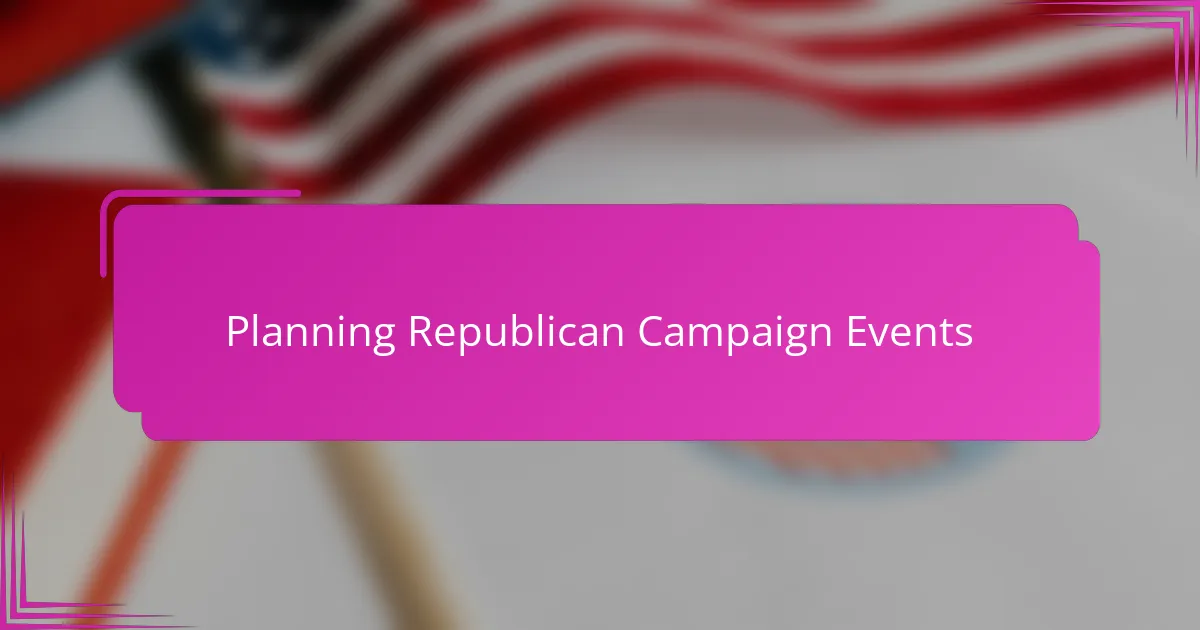
Planning Republican Campaign Events
When planning Republican campaign events, I always start by envisioning the atmosphere I want to create. How do you capture that blend of professionalism and heartfelt passion? For me, it’s about selecting venues that feel welcoming yet strong—spaces where attendees sense they’re part of something bigger, something meaningful.
Timing is another element I can’t overlook. Have you ever noticed how a well-timed event can ignite a wave of enthusiasm, while a poorly scheduled one falls flat? I once scheduled a gathering right after a big community event, and turnout was lower than expected. Learning from that, I now carefully consider the local calendar and work to avoid conflicts, making every event a focal point, not an afterthought.
Of course, no plan is complete without engaging the volunteers early and often. Assigning roles with clear responsibilities, while also encouraging input, creates a sense of ownership that shoulders the event with energy and dedication. I can still remember the buzz at a campaign kickoff when each volunteer’s excitement was so contagious it lifted the whole room—moments like that remind me why thoughtful planning is so crucial.
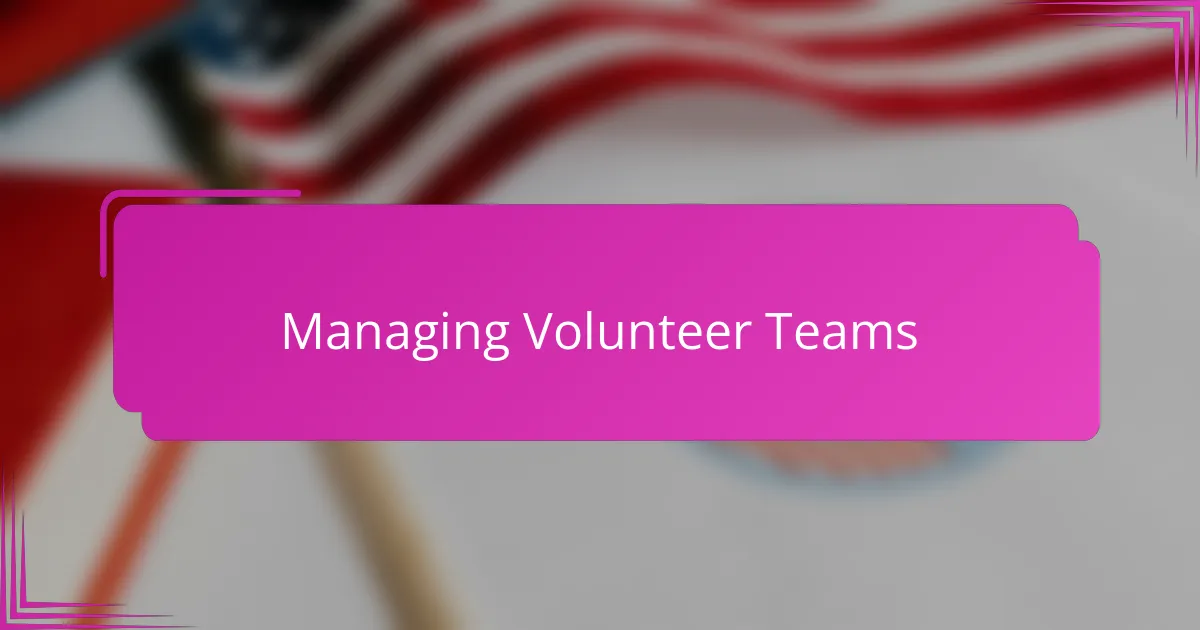
Managing Volunteer Teams
Managing volunteer teams taught me that clear communication is everything. Have you ever tried coordinating a group without setting expectations upfront? I found that taking the time to outline roles and check in regularly prevents confusion and keeps everyone motivated.
One thing I always emphasize is recognizing individual strengths. There was a volunteer who excelled at social media outreach, so I gave her leadership of that area. Watching her confidence grow—and seeing the campaign’s online presence surge—was a reminder that harnessing talents makes the whole team stronger.
But it’s not just tasks; it’s about building camaraderie. I recall organizing informal meetups for volunteers before events, which sparked friendships and boosted morale. When people feel connected on a personal level, their dedication shines through, turning efforts into genuine enthusiasm.
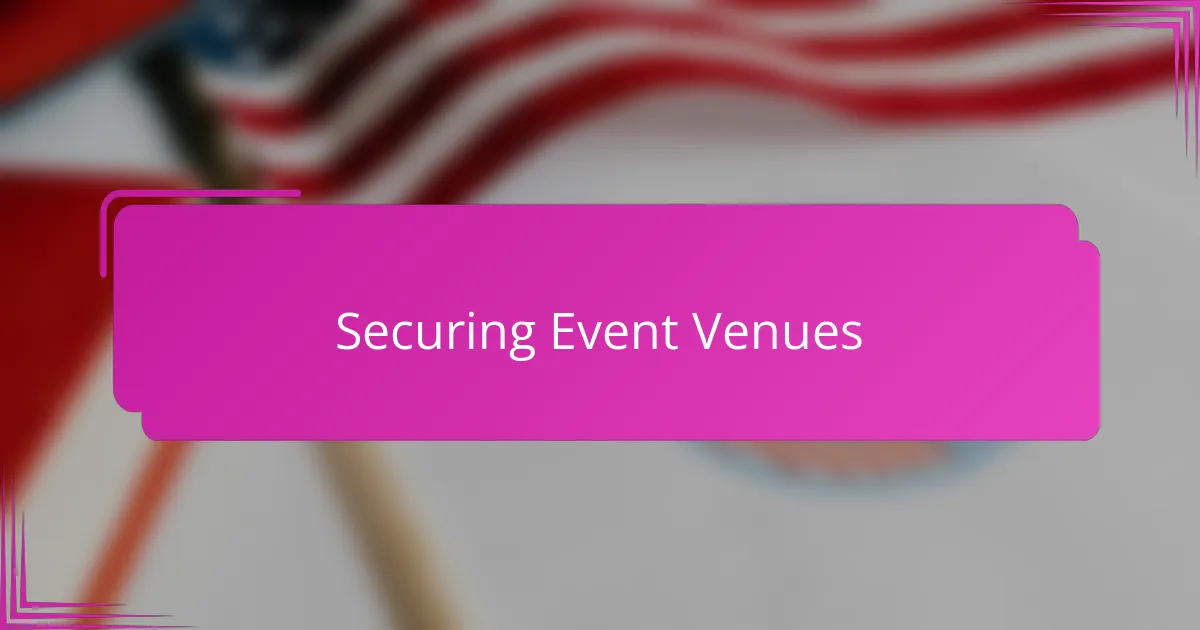
Securing Event Venues
Securing the right venue is where the foundation of any successful Republican event begins. Have you ever walked into a room and instantly felt the energy align with the cause? I’ve found that choosing a space that balances accessibility with the campaign’s image sets the tone before a single word is spoken.
I remember one early event where the venue was a local community center—convenient but lacking character. The turnout was decent, but the atmosphere felt flat. After shifting to a historic building downtown that echoed the campaign’s heritage and values, attendees talked about the venue as much as the speeches. That emotional connection mattered.
Also, the logistics involved in booking a venue taught me an important lesson: availability isn’t everything. I once had to scramble when a last-minute double booking forced us to move, causing confusion and cutting into preparation time. From then on, I insist on clear contracts and backup options—because a well-secured venue makes the difference between chaos and confidence.
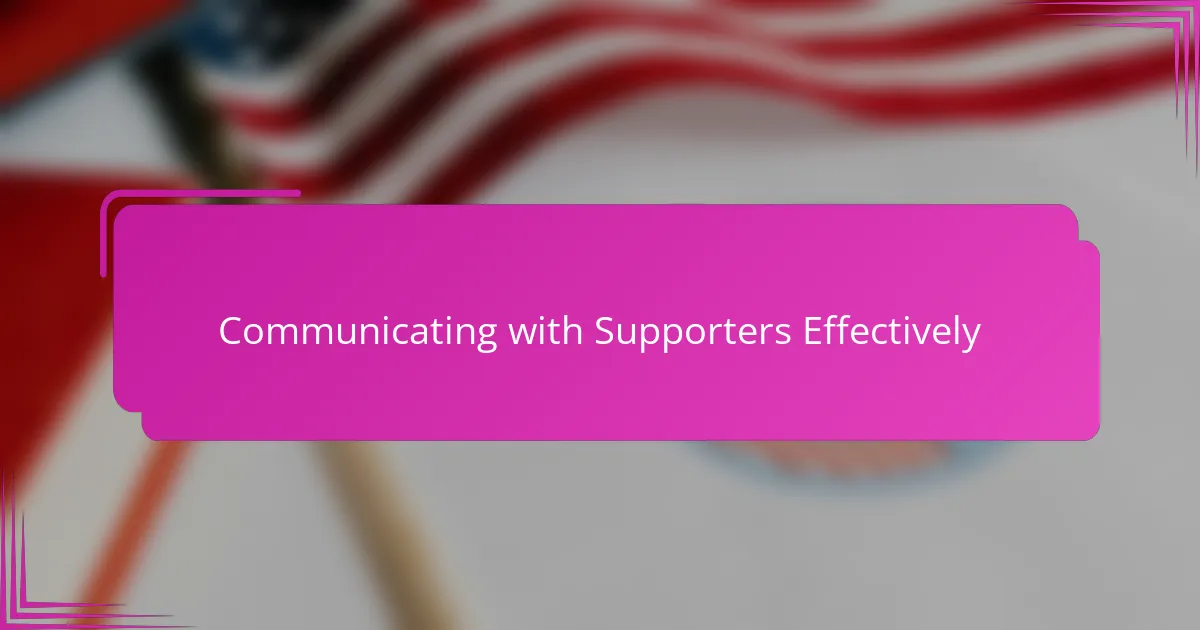
Communicating with Supporters Effectively
Communicating with supporters effectively means more than just sharing information; it’s about creating a genuine dialogue that makes people feel heard and valued. Have you noticed how a quick, personalized message can spark enthusiasm far more than a generic announcement? In one campaign, I made it a point to respond personally to supporter emails and comments—it transformed the relationship from distant to dynamic.
Another thing I’ve learned is the power of consistent, clear messaging. When everyone on the team understands and conveys the same core values, it builds trust and unity among supporters. I recall a time when mixed messages caused confusion and dampened spirits; we corrected it by holding brief daily check-ins, which aligned our communications and revived the crowd’s energy.
Lastly, I believe leveraging multiple channels—social media, phone calls, and face-to-face conversations—reaches supporters in ways that feel natural to them. For example, I once organized a small “coffee chat” event after a series of social media posts; it gave people a chance to talk candidly and strengthened their commitment. Effective communication, in my experience, is both strategic and deeply personal.

Lessons from My Event Experience
One lesson that stands out from my event experience is the importance of flexibility. Have you ever planned everything down to the last detail, only to have unforeseen challenges arise? In one instance, a sudden venue change tested our adaptability, but staying calm and creative turned what could’ve been a disaster into a memorable moment that brought the team closer together.
Another insight I gained is how vital it is to listen—not just to supporters, but to volunteers and staff. I once paused during an event prep to hear concerns from a volunteer, and that small moment of attention led to a change that improved the entire event’s flow. It reminded me that leadership isn’t just about giving orders; it’s about genuinely valuing every voice.
Finally, I learned that every event tells a story beyond speeches and signs. It’s about the energy in the room and the connections made. I still recall the feeling at a small town hall where strangers left as allies, united by a shared purpose. Those experiences teach me that successful events are less about perfection and more about creating spaces where people feel inspired to belong.